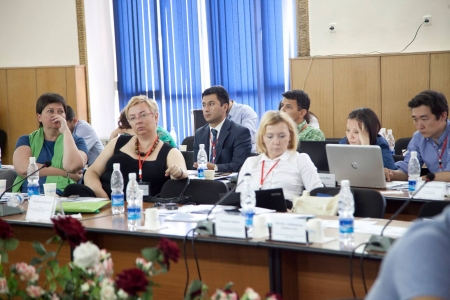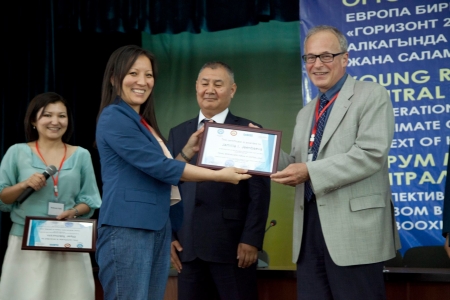News
Young Researchers Forum in Central Asia, 9 June 2016, Bishkek
The “Young Researchers Forum in Central Asia” took place on 9 June 2016, in Bishkek, Kyrgyzstan, in the framework of the FP7-funded Project “STI International Cooperation Network for Central Asia Countries – IncoNet CA”. The Forum was jointly organized by the Ministry of Education and Science of the Kyrgyz Republic, the Central Asian Agency of Cooperation for Development (CAACD), and the Centre for Regional & International STI Studies & Support (CeRISS).
The event was organized following an initiative of the Central Asian Agency of Cooperation for Development (CAACD), partner of the IncoNet CA project. It was hosted at the Grand Conference Hall of the Kyrgyz National University.
The Forum attracted around 150 participants from the CA research and academic community: researchers in the fields of Health, Climate Change and Energy, heads of universities, doctoral students, representatives of the local research institutions, as well as representatives of state agencies, international organisations and the business community.
The Forum’s objective was threefold:
(a) To inform and target young and promising researchers from Central Asia countries with information on the EU Framework Programme “Horizon 2020” and offer an incentive to start effective research cooperation with EU partners, in particular, in the fields of climate change, energy and health.
(b) To select CA researchers in order to present and discuss their research activities relevant to the topics that “Horizon 2020” Work Programmes on Energy, Climate Change and Health address for the years 2016-2017.
(c) To showcase successful examples of participation of Kyrgyz researchers in “Horizon 2020” projects’ consortia.
Welcoming speeches were addressed by Dr Abdumanap Attokurov, Vice-minister of education and science of the Kyrgyz Republic, Dr Talantbek Batyraliev, Minister of Health of the Kyrgyz Republic, Dr Biymyrza Toktoraliev, vice-president of the National Academy of Sciences, Mr Ermek Usekeev, vice-rector of the Kyrgyz National University (KNUJP), Mr Johannes Madsen, Head of Cooperation Section of the EU Delegation in Kyrgyzstan, Dr George Bonas, Coordinator of IncoNet CA, and Dr Nazik Beishenaly, Director of CAACD, member of the Science Council under the Prime-minister of the Kyrgyz Republic.
Speakers underlined the importance of the Forum in the context of ongoing research reforms in Kyrgyzstan, and stressed the importance of international cooperation with the EU for the progress of science, technology and innovation in Central Asia. Representatives of the main academic institutions in Kyrgyzstan expressed their readiness to collaborate with the European research community following the two successful Kyrgyz cases of participation in H2020: the Regional Office of the CAREN Project that was the first successful applicant from CA to H2020 with the MAGIC project and the Department of Pulmonology, National Center of Cardiology and Therapy that was the second successful applicant from CA to H2020 with the FRESHAIR project.
Participants received information about general rules of third countries' participation in H2020 & the EURAXESS initiative as well as funding opportunities under H2020 for topics in the fields of energy, climate change and health with particular emphasis on the ones indicating international cooperation. EU speakers included representatives from the Polish NCP network of the Polish Academy of Sciences, the Institute Pasteur, France and Bay Zoltan, Hungary.
A call for presentations was announced several months before the Forum for CA researchers with scientific background close to the topics that are currently open or forthcoming in H2020 on energy, climate change and health. The selection committee received 23 applications out of which 6 were selected to present during the Young Researchers Forum.
With most of them having a PhD degree from EU universities, the CA young researchers presented novel and promising research activities with relevance to H2020 topics, confirming the research excellence that Central Asia could dispose in the fields of energy, climate change and health. Presentations covered the following topics:
- The Multi-Stakeholder Approach for Green Economy Elements and Instruments Development in the Climate Change Adaptation in the Kyrgyz Republic
- Development of clean coal technologies at the Nazarbayev University, Kazakhstan
- Evaluation of indoor air pollution and prevalence of COPD among highlanders in Kyrgyzstan
- Alternative energy sources for transportation’s internal combustion engines
- Estimation of the impact of global climate change on the Tajikistan's glaciers
- Satellite Remote Sensing and GIS application in Agriculture and Water Management
In the discussions that followed, young researchers received practical advices for their participation in H2020 consortia. The necessity for young researchers to develop skills to effectively present the scope of their research to EU counterparts was also highlighted. It was agreed that the Polish NCP experts will disseminate the presented topics to European counterparts with information about CA researchers.
The Forum closed with remarks from Mr Abdumanap Muratov, Vice-minister of Education and Science of the Kyrgyz Republic, and Mr Eldar Abakirov, Vice-minister of Economy of the Kyrgyz Republic. Speakers stressed the importance of the research and innovation cooperation with the EU in the context of enhanced trade relations with the EU (accession of the Kyrgyz goods in the EU markets through the Generalized Scheme of Preferences) and mentioned the advanced discussions and the interest of the Kyrgyz business communities to collaborate with the Enterprise Europe Network.
Certificates of participation were awarded to all the young researchers that presented their projects. After the end of the Forum, an official closing dinner was organized with the participation of Elvira Sarieva, Minister of Education and Science of the Kyrgyz Republic, rectors and vice-rectors of Kyrgyz universities.







